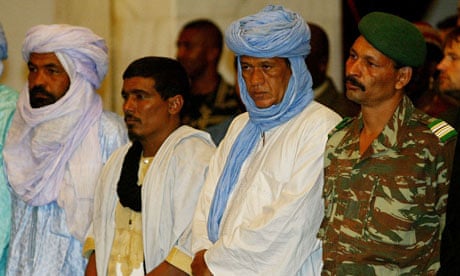Hamid did not touch his guitar from the day rebels arrived in the Mali town of Gao until the day the Islamists left. The Tuareg musician lived under the puritanical rule of the Mujao militia from April 2012 until the French army drove them out in January.
"All my band members left for Algeria or Niger but I stayed," he said. "I didn't agree with leaving. I didn't see why I should do it."
Life under sharia law was difficult and occasionally dangerous for a musician. But for many Tuareg – identifiable by their lighter skin – the prospect of living with the Malian army was worse. "I'm more frightened of the Malian Army and tribal militias like the Ganda Koy, than the Mujao (Movement for Unity and Jihad in West Africa)," he said. "All they look at is your colour."
As soon as the French arrived with Malian soldiers in their wake, Hamid (not his real name) left for Ouagadougou, the capital of neighbouring Burkina Faso, where he depends on the kindness of distant relatives.
The French foreign minister, Laurent Fabius, recently berated Mali's president Dioncounda Traoré about increasing reports of military violence against light-skinned civilians. Human Rights Watch and the UN High Commissioner for Human Rights have also accused the Malian army of racist attacks against innocent Tuareg, Arabs and Fulani men.
As many feared, wresting the northern two thirds of Mali back from the Islamists has been easier than reuniting the nation. The tumultuous events of the past year have provoked much soul-searching among Tuareg, calling into question their long-held dream for independence in the northern region of Mali that they call Azawad. Until 18 months ago, the nomadic Berber people whose territory straddles five Saharan nations, were best known in the west for their colourful clothing and music festival held in the desert near Timbuktu. This benign image soured in 2011 when reports emerged that opportunistic Tuareg mercenaries were propping up the regime of Muammar Gaddafi.
Things worsened in February 2012 amid news that heavily armed Tuareg fighters were sweeping from Libya back into northern Mali and teaming up with al-Qaida-linked jihadists to bring Mali to its knees.
Recently on Top Gear Jeremy Clarkson joked that Volkswagen was holding urgent board meetings after learning that the Tuareg, after whom a luxury 4x4 SUV was named a few years ago, were in fact "running guns from Libya to Mali and fighting there alongside hardline Islamists". Clarkson followed this with quips about "the new VW Lord's Resistance Army Van" with its "independent rear access or IRA"."
Yet most Tuareg do not even begin to see themselves as Islamists, terrorists or gunrunners and are dismayed by their new starring role in the "global war on terror".
Many Tuareg blame their former hero Iyad Ag Ghaly. Once a leader of the Tuareg separatist movement in Mali, Ag Ghaly, who had become a "born again" Muslim in the 1990s, made a pact with al-Qaida in the Islamic Maghreb (AQIM) early last year to take control of northern Mali and impose sharia law. Now he is on the run from the French and Chadian armies in the remote Tigharghar mountains in the far north east of Mali.
Despite their legendary reserve, many Tuareg find it difficult to hide their resentment towards Ag Ghaly. "Anyone who really knows Tuareg society will be aware it's one of the most tolerant societies in the world," says Anara Ag El Moctar, a Tuareg lawyer living in France. "I don't know Iyad Ag Ghaly but I think he's played a very negative role for our society. His desire to impose Salafism on us was incomprehensible. It doesn't resemble us at all. It's like putting hot pepper in milk."
A young MNLA (National Movement for the Liberation of Azawad) fighter was less charitable about the man they once called the Tuareg Che Guevara. "I never want to meet Iyad Ag Ghaly," he said, asking not to be named. "If I did I would probably have to kill him. He's ruined the image of the Tuareg. He's ruined our culture. He's ruined everything."
This upsurge of anger against Ag Ghaly is part of a wider dissatisfaction with many of the long-standing cadres and leaders of the Tuareg cause, who some believe are more interested in marbling their villas than serving their people. There's a growing feeling that the hegemony of powerful Tuareg families is doing a disservice to the people.
"The first priority for our people is education," says Fatimata Walet Oumar, a Tuareg women's rights activist and leader singer of the group Tartit Ensemble. "I mean for children of the poorest sections of society. Hierarchies must change. In fact they are already changing. The powerful clans have their history. It's there and it can't be changed. The future is something else."
A former rebel leader who now works for the Tuareg prime minister of Niger, Brigi Rafini, says the Tuareg can no longer view their cause in ethnic terms. "The politics of the uprising in Mali are stronger than me and stronger than my region," he says. "It's not just a problem of the Maghreb or the Sahel. It's an international problem. Americans and Europeans, Chinese and Japanese are involved. We have no experience of that. But we've begun to learn, we've begun to play the game."
Nonetheless the old cause lives on. "I still have the dream of independence," said the MNLA fighter. "It's engraved in our hearts. There will always be turncoats and traitors but even if they've signed some kind of accord with Mali, tomorrow someone will awaken. Maybe me, maybe someone else or maybe the child of one of the people they killed. We'll never get to the end of it. There are too many orphans now."

Comments (…)
Sign in or create your Guardian account to join the discussion